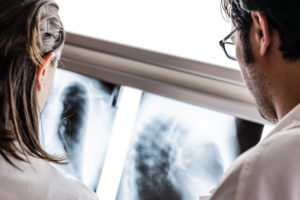Based on estimates put out by the American Cancer Society, 222,500 Americans (116,990 men and 105,510 women) will be diagnosed with lung cancer in 2017. It continues to be the leading cause of cancer death and kills more people than breast, colon and prostate cancers combined. These startling statistics are largely due to the fact that lung cancer is a “silent killer,” showing no symptoms until the disease has already reached an advanced stage.
While progress continues to be made in the battle against curing this condition, the true key to combatting it is through early detection via lung cancer screening.

Over the years, physicians have determined that a low-dose computed tomography screening—alsoknown as an LDCT or low-dose CT—is the recommended diagnostic test for individuals who are at high risk of developing lung cancer.
During the five to seven-minute scan, detailed images of the lungs are generated that are far more sensitive than traditional chest X-rays in detecting any abnormalities.
It is recommended that people who meet the following criteria (and are considered high risk) should undergo an LDCT include those:
Age 55 years or older
Aging is a risk for everyone across the board. In fact, more than two-thirds of the patients diagnosed with lung cancer are over 55 at the time of their diagnosis.
Who currently smoke or have quit smoking within the last 15 years
According to several studies of those recently diagnosed with lung cancer, 85% are current or former smokers.
Who are asymptomatic (no presenting symptoms)
Presenting with no symptoms is a key factor because a screening is defined as looking for disease in the absence of symptoms
That have a smoking history of at least 30-pack years
Smoking causes an estimated 160,000 lung cancer deaths every year. The longer an individual is exposed to tobacco (i.e., cigarettes, cigars, pipes), the greater the risk that lung cancer will occur. A pack year is the number of packs smoked per day multiplied by the number of years that a person has smoked.
Additional considerations that increase the risk for lung cancer include:
Contact with radon, asbestos or other cancer-causing substances
According to the Environmental Protection Agency (EPA), radon is the number one cause of lung cancer among nonsmokers and the second leading cause of lung cancer overall. Radon exposure also raises the incidence of lung cancer in smokers exponentially.
In addition, other carcinogens (cancer-causing substances) such as asbestos, arsenic, soot and tar are known to cause lung cancer, especially in those who’ve been exposed over many years.
Family history of lung cancer
Individuals with an immediate family member—mother, father, sibling or child—who have had lung cancer may have an increased risk of developing the disease.
Personal history of lung disease (e.g., COPD, pulmonary fibrosis)
Those who have a history of other lung diseases—such as pulmonary fibrosis, tuberculosis or chronic obstructive pulmonary disease (COPD)—are at risk of developing lung cancer.
History of radiation to the chest area
According to the Centers for Disease Control (CDC), cancer survivors who went through radiation therapy also have a higher risk of lung cancer occurring.
Don’t let lung cancer sneak up on you. If you feel that any of these risk factors may apply to you, schedule a lung screening today.
If you have recently had a scan, been diagnosed or need a second opinion, our team of specialists will help evaluate findings and devise a treatment plan that is right for you.
As the pioneers of video-assisted thoracic surgery (VATS), we have decades of experience in minimally invasive surgical treatment and can provide our patients with helpful information on their conditions. Thoracic Group surgeons work in collaboration with a team of specialists, including oncologists, pulmonologists, radiologists, pathologists and nurse navigators.
For more information or to schedule an appointment, contact Thoracic Group today.